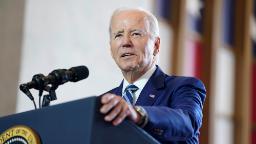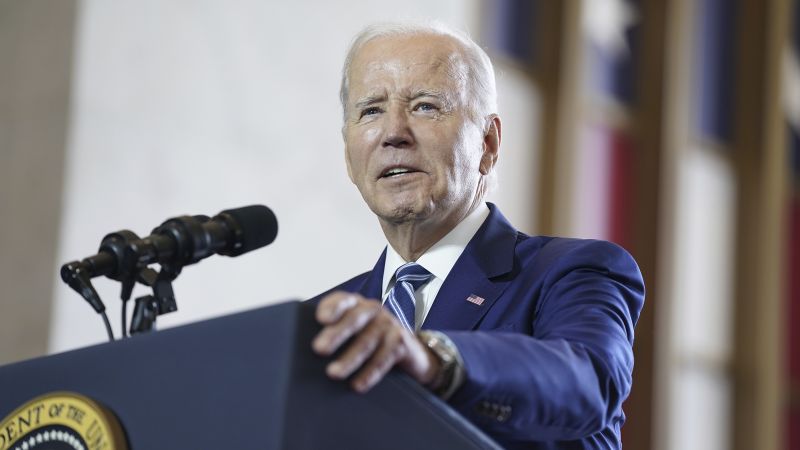
Chicago
CNN
—
President Joe Biden’s top economic advisers believe the worst effects of inflation are in the rear-view mirror. They are increasingly confident the economy is heading for a soft-landing, averting a recession. And a growing number of economists are beginning to agree.
There’s just one problem: most Americans are convinced the economy is in bad shape, and they blame the president.
Enter “Bidenomics.”
Searching for a solution to Americans’ negative perception of the economy and a vehicle to take credit for an economy that is increasingly trending in the right direction – all as Biden’s reelection campaign gets underway – the White House is embracing the term.
“Bidenomics” was at the heart of a major economic speech the president delivered Wednesday in Chicago, where he ticked through positive economic indicators and outlined a vision of economic revival.
“I came into office determined to change the economic direction of this country, to move from trickle-down economics,” Biden said at the Old Chicago Main Post Office.
“I didn’t come up with a name,” he said, crediting the news media for inventing the term Bidenomics. “I really didn’t. I now claim it.”
Ahead of the speech, aides described the address as an opportunity for Biden to lay out his economic vision for the future while also articulating how he believes his economic policies have delivered so far.
But it was also an opportunity for Biden to explain what his economic policy was not.
“Folks, let me say as clearly as I can, the trickle-down approach failed the middle class. It failed America, blew up the deficit, increased inequity and weakened our infrastructure,” he said.
Throughout his speech, Biden took aim at his predecessor for failing to accomplish what he’d promised, including improving the nation’s infrastructure.
And he vowed to continue pressing for tax increases on the wealthy and expanding childcare and education access, both items he’s unsuccessfully sought during his first term.
Those items are opposed by many Republicans, but Biden said his agenda could unify Americans.
“I think we’re going to help lessen the division in this country by bringing us back together,” he said. “It makes it awful hard to demagogue something when it’s working.”
White House officials have been preparing a more comprehensive economic messaging push for months and the decision to launch now reflects the White House’s settled confidence that the economy’s positive trajectory is sustainable. The debt ceiling impasse also needed to be resolved and Biden’s key economic legislation needed to begin to be implemented.
Now, officials see Bidenomics as an opportunity to tie together the president’s economic accomplishments, the vision behind those policies and a growing economy under one term.
“Bidenomics is rooted in the simple idea that we need to grow the economy from the middle out and the bottom up – not the top down,” reads a bolded section of a memo distributed by two of the president’s senior advisers, Anita Dunn and Mike Donilon, earlier this week.
That Dunn and Donilon are messaging experts and not economists is a telling sign of the origins of “Bidenomics” as partly a branding exercise. Aides are hopeful a more concerted effort to convince Americans of the economy’s strength – and Biden’s own role in managing it – will improve his political standing.
How much a new name can help in that effort remains to be seen. Biden has been traveling the country for the better part of two years talking about his efforts to boost manufacturing, invest in new infrastructure and create job training programs for Americans without college degrees.
Though polls show Americans broadly support elements of Biden’s economic agenda – a point Dunn and Donilon made in their three-page memo – a wide swath of Americans continue to widely disapprove of how he’s handled the economy: 66%, according to a CNN poll conducted by SSRS in May.
That same poll showed most Americans view the economy as lackluster, with 76% describing it as in poor shape, up from 71% who felt that way in March.
Asked about the disconnect between increasingly positive economic data and Americans’ perceptions of the economy, Biden’s chief economic adviser Lael Brainard pointed to the “record economic uncertainty” that Americans have faced over the last two years as the country emerged from the pandemic and experienced the knock-on effects of Russia’s invasion of Ukraine.
“What the president would say is people need to see it. They need to see it in their communities. And that’s what his policies are all about,” Brainard said in an interview. “As Americans see that and experience it, the president is confident that they are going to feel much more optimistic about their own economic futures.”
While the president’s top messaging advisers home in on the “Bidenomics” term as a way to lift up his economic record and contrast it with Republican economic policies, the prominent push also runs the risk of Republicans co-opting it to describe the not-so-bright spots in the current economy or to tie the president to the still-looming possibility of another economic downturn.
“It’s really not about a term,” Brainard said when asked about how Republicans might co-opt it. “It’s not about a word. It’s about an economic plan that the president has put in place that is in contrast with trickle down (policies).”
“Listen, even if the economy is doing well, the Republicans will say it’s doing poorly,” Dunn, the president’s senior adviser, said on MSNBC earlier this week. “So, we’re not going to spend a huge amount of time worrying about them.”
Attaching a “-nomics” to the end of a president’s name has been routine since President Richard Nixon. As often as not, it’s used as a pejorative by opponents; nothing helps simplify something as complicated as a bad economy than a buzzword.
No president has been more associated with a “-nomics” than Ronald Reagan, whose “Reaganomics” described a supply-side, trickle-down approach that has largely defined Republican economic policy for the last 40 years.
Biden has made little attempt at disguising his distaste for that approach; he’s made a part of his stump speech a takedown of policies he insists will never benefit middle-class, blue-collar workers.
“Not a lot trickled down to my parents’ kitchen table when I was growing up,” Biden has said in various forms over the past several years (never mind that Biden was in his 40s during Reagan’s attempt at trickle-down economics).
Bidenomics, at least in the White House’s definition, is as much identified by what it is not as it is by a particular set of policies or ideas.
“If Reaganomics was based on the idea that if you cut taxes for the wealthiest corporations, the wealthiest people in this society, and that at some point, the remnants of those will trickle down to the middle class and the working class, Bidenomics is the exact opposite. Bidenomics says that the way to grow the economy in this country is you grow the middle class,” Dunn said on MSNBC.
Biden himself seemed surprised this month that his surname had achieved “-nomics” status.
“I didn’t realize I had Bidenomics going,” he said during a news conference with his British counterpart on June 8, suggesting he’d learned the term in the pages of the Wall Street Journal.
Ten days later – as the White House put the final touches on the forthcoming messaging push – he hadn’t seemed to achieve any more clarity on what, exactly, this theory of his was.
“We decided to replace this theory (trickle-down economics) with what the press has now called ‘Bidenomics,’” he said during a political rally with union members in Philadelphia. “I don’t know what the hell that is. But it’s working.”
But when faced with the question of whether “Bidenomics” can be the answer to changing public perception of the president’s record, White House press secretary Karine Jean-Pierre offered a frank reply: “We’re going to try. Right?”

